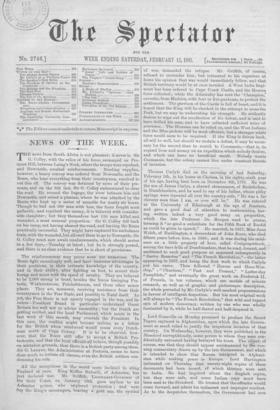Thomas Carlyle died on the morning of last Saturday, February
5th, in his house at Chelsea, in the eighty-sixth year of his age, having been born ou December 4th, 1795. Ho was the son of James Carlye, a shrewd stonemason, of Ecolefechan, in Dumfriesshire, and he used to say of his father, whose pithy sayings were repeated all over the country-side, " He was a far cleverer man than I am, or ever will be." He was entered. at the University of Edinburgh at the age of fourteen, and gave a good deal of attention to mathematics, hav- ing written indeed a very good essay on proportion, which the late Professor De Morgan used to praise, terming it "as good a substitute for the Fifth Book of Euclid as could be given in speech." He married, in 1827, Miss Jane Welsh, of Haddington, a descendant of John Knox, who died fifteen years before him, in 1866; and it was during his resid- ence on a little property of hors, called Craigenputtock, among the bare hills of Dumfriesshire, that he read, dreamt, and meditated to such good purpose as appeared subsequently in " Sartor Resartus " and "The French Revolution,"—the latter appearing in 1837, and being the first work to which Carlyle put his name. Then followed " Heroes and Hero-Wor- ship," . " Chartism," " Past and Present," " Latter-day Pamphlets," and eventually the great work on Frederick II. of Prussia, in ten volumes, which are models of minute research, as well as of graphic and picturesque description, the whole pervaded by Mr. Carlyle's well-marked prepossessions in favour of intelligent despotism. But his most original work will always be "The French Revolution," that wild and rugged epic of modern democracy, written by one who was wholly fascinated by it, while he half-feared and half-despised it.


































